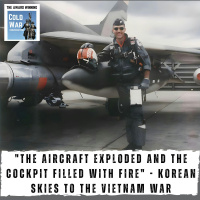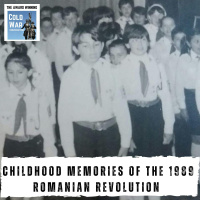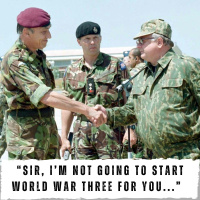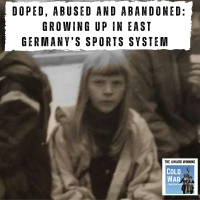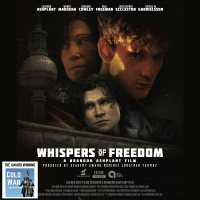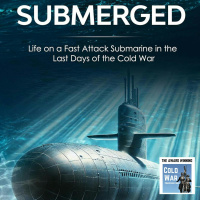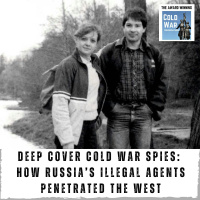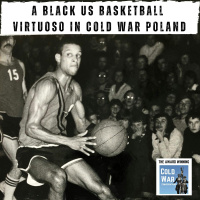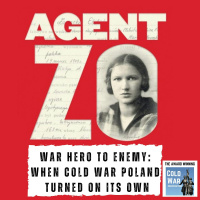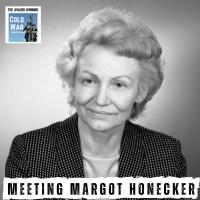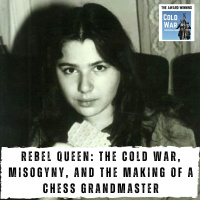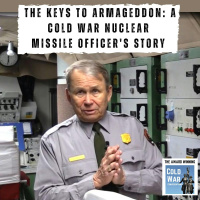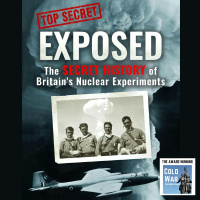Synopsis
In conversation with those that experienced the Cold War and those who are fascinated.
Episodes
-
"The aircraft exploded and the cockpit filled with fire" - Korean skies to the brutal Vietnam War (404)
23/05/2025 Duration: 01h28minColonel Robert J. Graham, USAF (Ret.), was more than a fighter pilot—he was a leader, a warrior, and a witness to one of the most complex conflicts in modern history. From the chaotic early days of guerrilla warfare in Vietnam to the bureaucratic maze that engulfed the later years, Colonel Graham's four combat tours reveal the triumphs and tragedies of a war that reshaped his world and his nation. Buy Col Graham’s book here "One of the Few: A True Account of Courage and Stepping into the Fight" and support the podcast. With vivid detail, he takes you into the cockpit of supersonic jets, the gritty realities of jungle warfare, and the tense moments of life-or-death decision-making. From earning the prestigious Silver Star to commanding the 4th Tactical Fighter Squadron through the final stages of U.S. involvement, Graham's stories balance fearless heroism with unflinching honesty. Feel the adrenaline of battle. Experience the camaraderie of brothers-in-arms. Witness the sacrifices—and the cost—of duty.
-
Childhood Memories of the 1989 Romanian Revolution (403)
16/05/2025 Duration: 01h03minTraian grew up in Romania during the tumultuous 1980s under the shadow of the communist regime of Nicolae Ceaușescu. We learn about the harsh realities of life under communism, where shortages of basic goods were commonplace. He shares the clever tactics he and his family employed to navigate these challenges, including trading items with tourists and listening to forbidden radio stations like Radio Free Europe for music and news. These experiences shaped his understanding of the world outside Romania, igniting a desire for freedom and change. The narrative takes a dramatic turn as the Romanian revolution unfolds in December 1989. Traian recounts the fear and uncertainty that gripped the nation as protests erupted, leading to the eventual overthrow of Ceaușescu. He vividly describes his school trip during this pivotal moment and the surreal experience of returning home to a city forever changed by the events of those days. Further info and videos https://coldwarconversations.com/episode403/ The figh
-
“Sir, I’m not going to start World War Three for you” - The NATO Russian confrontation in 1999 at Pristina Airport (402)
09/05/2025 Duration: 01h35minIn this gripping episode, we hear a detailed account from an eyewitness right at the heart of the tense NATO and Russian confrontation in Kosovo in 1999 at Pristina Airport. NATO General Wesley Clark had ordered the British to use force to remove Russian forces, however British General Mike Jackson refused with the immortal words “Sir, I’m not going to start World War Three for you”. Former BRIXMIS officer Stephen Harrison was a British Army liaison officer to the Russians and the translator at the complex and fraught negotiations at the airport. He provides a blow-by-blow account from the detailed notes he took at the time. Further info and videos https://coldwarconversations.com/episode402/ Stephen's previous episodes: Arrested 11 times, plus 3 shooting incidents - a BRIXMIS officer's diary Pt 1 https://pod.fo/e/13af96 Imprisoned in a Soviet Military gaol - a BRIXMIS officer's diary Pt 2 https://pod.fo/e/13ca90 The fight to preserve Cold War history continues and via a simple monthly donati
-
“Houston, we’ve had a problem” interview with Fred Haise, Apollo 13 astronaut (401)
02/05/2025 Duration: 01h32minThis is a repeat of an episode published in September 2022. 55 years ago last month Fred Haise was one of the three astronauts on the ill-fated Moon mission when a design fault caused an oxygen tank to explode mid-mission putting the Apollo 13 crew in mortal danger on April 13th, 1970. This was the seventh crewed mission in the Apollo space program and the third meant to land on the Moon. Buy Fred’s book here “Never Panic Early: An Apollo 13 Astronaut’s Journey” and support the podcast. Now as you can imagine I’m genuinely excited to be speaking with one of the Apollo astronauts. Fred and I talk about his life and his almost accidental entry into flying. We cover his admission into the astronaut programme, the family impact, and as you can imagine go into some detail about his experiences on the Apollo 13 mission. Many of you will know of this mission via the Film “Apollo 13” starring Tom Hanks, and Fred shares his views on the film and corrects some of the inaccuracies. Episode extras https://coldwar
-
Doped, Abused and Abandoned: Growing Up in East Germany’s Sports System (400)
25/04/2025 Duration: 01h16minThis episode covers themes of physical and emotional abuse as well as suicide. If you need support please follow the links below. UK https://www.samaritans.org/how-we-can-help/contact-samaritan/ Rest of the World https://findahelpline.com/i/iasp Kerstin recounts her harrowing childhood and life experiences in East Germany. She was identified at a young age for elite sports training, which led to intense gymnastics regimens, physical and emotional abuse, and state-sponsored doping. When she was dismissed from the sports program without warning she was left isolated and struggling with identity loss. Her personal life deteriorated further after her father’s death, and she turned to alcohol and self-destructive behaviour. Despite enduring severe trauma, Kerstin ultimately found healing and reconciliation with her past. She received state compensation for the doping-related damage to her health, repaired her relationship with her mother, and now shares her story to ensure the dark realities of th
-
Whispers of Freedom: Portraying the Story of the last person shot at the Berlin Wall (399)
22/04/2025 Duration: 50minChris Gueffroy, was the last person to be shot dead at the Berlin Wall and a new short film called “Whispers of Freedom” portrays his story. I speak with the film’s director Brandon Ashplant who shares the challenges of accurately portraying real individuals with deep personal histories. Actors Cameron Ashplant (Chris) and Wendy Makkena (Karin) reflect on research they undertook to authentically represent life in East Germany. The discussion also touches on the emotional impact of visiting key locations including Chris’s grave and the site of his death, and the delicate process of obtaining consent from his family to tell this story. Episode extras https://coldwarconversations.com/episode399/ Where can I see the film? There’s been various updates since we recorded. The trailer has been released and is available on the Golden Goat Films Facebook and Instagram pages (@goldengoatfilms). The World Premier is at the Sunderland Shorts Film Festival at 18:00 on Friday 16th May at the Omniplex, Sunderland. C
-
Submerged: Life on a Fast Attack Submarine in the Last Days of the Cold War (398)
18/04/2025 Duration: 01h05minFormer US Navy Commander Henry Rausch is the author of Submerged: Life on a Fast Attack Submarine in the Last Days of the Cold War. Henry shares his experiences from training to life aboard a submarine, emphasising the challenges, mishaps, and the camaraderie among the crew. He provides vivid descriptions of the rigorous training, the psychological demands, and the technical operations of submarines, including navigating under ice and surfacing manoeuvres. Henry also discusses the toll his career took on his personal life and his eventual transition to the reserves as the Cold War wound down. His story is enriched with unique anecdotes, culminating in a detailed account of a gas leak incident. He also gives a nod to the mentorship and collaboration with officers from allied navies, particularly highlighting his respect for a UK submarine officer. All our submarine stories https://open.spotify.com/playlist/5QQHCaEdQB2hAfcaQAxFyn?si=9a7e61ff56624594 Enter the book giveaway here https://coldwarconversation
-
Deep Cover Cold War Spies: How Russia’s Illegal Agents Penetrated the West (397)
11/04/2025 Duration: 01h11minIn 2010, two decades after the Cold War had ended, ten Russian spies were arrested in America, having hidden their true identities from their friends, neighbours and even their children. They were part of a spy programme that had begun nearly a century earlier, when the revolutionary Bolshevik government began sending Soviet citizens abroad to pose as foreign aristocrats, merchants and students. These deep-cover missions - some remarkable feats of espionage, others high-profile failures - could last for decades. Drawing on hundreds of hours of interviews, as well as newly discovered archival material, Shaun Walker brings this history to life in The Illegals: Russia's Most Audacious Spies and the Plot to Infiltrate the West, a page-turning tour de force that goes to the heart of what became the most ambitious espionage programme in history. Enter the book giveaway https://coldwarconversations.com/giveaway1/ Episode extras https://coldwarconversations.com/episode397/ Related episodes Portland Spy Ring
-
A Black US Basketball Virtuoso in Cold War Poland (396)
04/04/2025 Duration: 01h25minThe Communist Polish press called it "Kentomania!"—the excitement surrounding a 23 year old, called Kent Washington who made history as the first American—and the first Black American—to sign a professional sports contract behind the Iron Curtain. Stepping off the plane in Poland, Kent was immediately struck by how different everything felt. Yet, it was on the basketball court where he found common ground with the Polish people. His creative and electrifying gameplay won over audiences, earning him admiration and respect. But beyond basketball, the warmth and hospitality of the Polish people left a lasting impression, making him a beloved figure in the country’s sports history. As a result, Kent was inspired to write a memoir, ‘Kentomania: A Black Basketball Virtuoso in Communist Poland’. BUY THE BOOK HERE Episode extras https://coldwarconversations.com/episode396/ The fight to keep Cold War history alive continues, and with your support, I can ensure these incredible stories are never forgotten. A s
-
Agent Zo - From War Hero to Enemy: When Cold War Poland Turned on Its Own (395)
29/03/2025 Duration: 01h02minIn a world where history often overlooks the contributions of women, the story of Agent Zo stands out as a beacon of bravery and resilience. I spoke with Claire Mulley about her book Agent Zo: the Untold Story of a fearless World War II resistance fighter. From the first day of the war to the German surrender, Zo organised efforts to resist the Nazi invasion of Poland, displaying extraordinary courage and leadership. However, the aftermath of the war brought new challenges. Despite her heroic actions, Zo and many others faced persecution from the new communist authorities of Poland. Buy the book here https://uk.bookshop.org/a/1549/9781399601061 Don’t miss the link to the videos and photos in the episode information here https://coldwarconversations.com/episode395 The fight to keep Cold War history alive continues, and with your support, I can ensure these incredible stories are never forgotten. A simple monthly or annual donation gives me the resources to continue uncovering a
-
In Conversation with Margot Honecker (394)
26/03/2025 Duration: 31minI speak with Jon Benjamin who recounts his meetings with Margot Honecker, the unrepentant architect of East Germany’s education system and widow of GDR leader Erich Honecker then living in exile in Chile. In 2012 and 2013, when Jon was British Ambassador to Chile, he had three long meetings with Margot Honecker, third wife of longtime East German leader, Erich Honecker, and Minister of Education of the German Democratic Republik (GDR) in her own right from 1963 to 1989. You can read more about his meetings at History Reclaimed here Episode extras here https://coldwarconversations.com/episode394 The fight to keep Cold War history alive continues, and with your support, I can ensure these incredible stories are never forgotten. A simple monthly or annual donation gives me the resources to continue uncovering and sharing the untold history of this fascinating era. As a valued supporter, you’ll become part of our exclusive community, enjoy ad-free episodes, and receive the coveted CWC coaster as a token of
-
The Cuban Missile Crisis Suicide Missions (393)
22/03/2025 Duration: 57minRichard F Kaufman is the author of A One-Way Trip to Death A Survivor’s View of Cruise Missiles in the Cuban Missile Crisis In the 1950s he served in the Korean War, where he was shot down and provides a vivid snapshot of flying in that conflict. On his way to Korea Richard meets a Japanese Kamikaze pilot. The pilot’s reflections on life and death left a lasting impact on Richard, shaping his perspective as he began training for effectively suicide missions guiding nuclear missiles to the Soviet Union. He describes the fear and uncertainty surrounding the Cuban Missile Crisis and the belief that war was imminent as the Last Rites are read to him while preparing for what he believed was his final mission. BUY THE BOOK HERE Don’t miss the link to the videos and photos in the episode information here https://coldwarconversations.com/episode393 The fight to preserve Cold War history continues and via a simple monthly donation, you will give me the ammunition to continue to preserve Cold War history.
-
Rebel Queen: The Cold War, Misogyny, and the Making of a Chess Grandmaster (392)
15/03/2025 Duration: 55minSusan Polgar is the author of Rebel Queen: The Cold War, Misogyny, and the Making of a Grandmaster. Born to a poor Jewish family in Cold War Budapest, Susan Polgar had the odds stacked against her growing up in a sexist and oppressive culture. Yet her father subscribed to the belief that geniuses are not born, but created, so he set out to ensure her success in an unlikely field: chess. At age 4, she won her first tournament. By 15, she was the top‑rated female player in the world. She was the first woman ever to hold the men's Grandmaster title, chess' highest designation. The ensuing wins and accolades provided incredible highs to coincide with extreme lows as Polgar's celebrity brought backlash, including sabotage and state‑sponsored intimidation. Don’t miss the link to the videos and photos in the episode information here https://coldwarconversations.com/episode392 The fight to keep Cold War history alive continues, and with your support, I can ensure these incredible stories are never forgotten.
-
The Keys to Armageddon: A Cold War Nuclear Missile Officer's Story (391)
08/03/2025 Duration: 01h08minJim is a former Minuteman nuclear missile officer who served in the US Air Force. Throughout the episode, Jim shares first-hand accounts of life in the launch control centre. From evaluations to the strict checklist orientations, every aspect of his training was designed to ensure that he and his crew were prepared for the weighty responsibilities they bore. We also discuss false alarms, intense simulations and emergency procedures, enabling you to gain a profound understanding of the pressure and seriousness of the role. Jim also reflects on the gravity of turning the keys to launch missiles and the sobering reality of what that would mean for humanity. Don’t miss the link to the videos and photos in the episode information here https://coldwarconversations.com/episode391 The fight to preserve Cold War history continues and via a simple monthly donation, you will give me the ammunition to continue to preserve Cold War history. You’ll become part of our community, get ad-free episodes, and get a s
-
The Secret History of Britain's Cold War Nuclear Experiments (390)
01/03/2025 Duration: 01h10minThe race to build a British nuclear bomb sucked thousands into its vortex, who are still dealing with the effects of radiation today: veterans, widows, children, scientists and indigenous people, all subjected to fear, radiation, and experimentation. A black cloud still hangs over those who survive, and their descendants who fear the consequences of every fresh pregnancy. But for seven decades the veterans who created it have been denied truth and justice. As the handful of survivors launch a last-ditch legal bid for the answers, I speak with Daily Mirror journalist Susie Boniface whose new book, Exposed: The Secret History of Britain's Nuclear Experiments reveals the full price they paid for our peace and prosperity. Enter the book giveaway here https://coldwarconversations.com/giveaway/ Links Crowd funder for the Veterans Legal Case BBC Iplayer - Britain's Nuclear Bomb Scandal: Our Story LABRATS International Nuclear Veterans https://www.facebook.com/groups/nucleartestveterans Don’t miss the link t
-
Surviving the Fastnet Sailing Disaster with a British Prime Minister (389)
22/02/2025 Duration: 42minDavid recounts his experiences sailing with former British Prime Minister Edward Heath, offering a unique glimpse into the life of a man who once led a nation. From the camaraderie on board to the challenges faced during the races, David's anecdotes paint a vivid picture of life at sea. But it is the 1979 Fastnet Race that stands as a centrepiece of this episode—a maritime disaster marked by perilous storms and the resilience of the human spirit. David's firsthand account of navigating through this storm is both harrowing and inspiring. His stories of survival and teamwork, offer listeners a front-row seat to one of the most dramatic events in sailing history. As David shares his memories, he also reflects on the lessons learned from his time at sea and the friendships forged during those challenging times. His story is not just about sailing; it is about determination, leadership, and the pursuit of excellence in the face of adversity. Whether you're a sailing enthusiast, a history buff, or simply someo
-
From the Merchant Navy to Covert Hunter Killer Nuclear Submarine Missions (388)
15/02/2025 Duration: 01h17minDavid Arnold joined the merchant navy at just 14. His tales offer a glimpse into the rigorous and sometimes harsh realities of naval training in the 1950s. His story takes us through his progression in the merchant navy, where he earned his extra master's ticket, a rare and prestigious qualification that opened doors to a career in marine surveying and beyond. David recounts his experiences with the Royal Naval Reserve, particularly his time aboard the nuclear submarine, Valiant where we are treated to a behind-the-scenes look at Cold War-era missions, including covert operations. David's engaging storytelling and wealth of experience make for a captivating narrative. Don’t miss the link to the videos and photos in the episode information here https://coldwarconversations.com/episode388/ The fight to preserve Cold War history continues and via a simple monthly donation, you will give me the ammunition to continue to preserve Cold War history. You’ll become part of our community, get ad-free episode
-
Frozen in Time - the Cold War Nottingham War Rooms (387)
08/02/2025 Duration: 52minLast year I was given the unique opportunity to visit the Nottingham War Rooms. The site is about to be re-developed so it was a rare chance to see a British Regional Seat of Government bunker that has lain relatively untouched since the end of the Cold War. The voices you will hear are Dan Cordle, an Expert in Nuclear Culture & History and Parmi Uppal, Estates Manager for Homes England. Don’t miss the link to the videos and photos in the episode information here https://coldwarconversations.com/episode387/ The fight to preserve Cold War history continues and via a simple monthly donation, you will give me the ammunition to continue to preserve Cold War history. You’ll become part of our community, get ad-free episodes, and get a sought-after CWC coaster as a thank you and you’ll bask in the warm glow of knowing you are helping to preserve Cold War history. Just go to https://coldwarconversations.com/donate/ If a monthly contribution is not your cup of tea, we welcome one-off donations via the sa
-
Defending Baltic Skies : A Swedish Air Force Pilot's Cold War (386)
01/02/2025 Duration: 01h34minDuring the Cold War Sweden outwardly maintained its neutrality, however from the 1960s the U.S. secretly promised to provide military force in aid of Sweden in case of Soviet aggression. As part of the military cooperation, the U.S. provided much help in the development of the Saab 37 Viggen aircraft. I spoke with Benke, a former Swedish Air Force pilot who flew the Viggen. He shares his path to becoming a pilot in the Air Force, the intricacies of flight training, encounters with Soviet aircraft during the Cold War, and the unique challenges faced by the Swedish Air Force. Join me for an insightful discussion that highlights the passion for flying and the realities of Cold War military aviation! Episode extras here https://coldwarconversations.com/episode386/ The fight to preserve Cold War history continues and via a simple monthly donation, you will give me the ammunition to continue to preserve Cold War history. You’ll become part of our community, get ad-free episodes, and get a sought-after CWC co
-
Letters across the Iron Curtain - Unseen Cold War Correspondence between Soviet and American Women (385)
25/01/2025 Duration: 01h04minIn the tense years of the early Cold War, American and Soviet women conducted a remarkable pen-pal correspondence that enabled them to see each other as friends rather than enemies. In a compelling new perspective on the early Cold War, prizewinning historian Alexis Peri’s new book “Dear Unknown Friend” explores the correspondence between American and Soviet women beginning in the last years of World War II and continuing into the 1950s. Previously unexamined, the women’s letters movingly demonstrate the power of the personal, as the pen pals engaged in a “diplomacy of the heart” that led them to question why their countries were so divided. Buy the book here https://uk.bookshop.org/a/1549/9780674987586 Episode extras here https://coldwarconversations.com/episode385/ The fight to preserve Cold War history continues and via a simple monthly donation, you will give me the ammunition to continue to preserve Cold War history. You’ll become part of our community, get ad-free episodes, and get a sought-af

